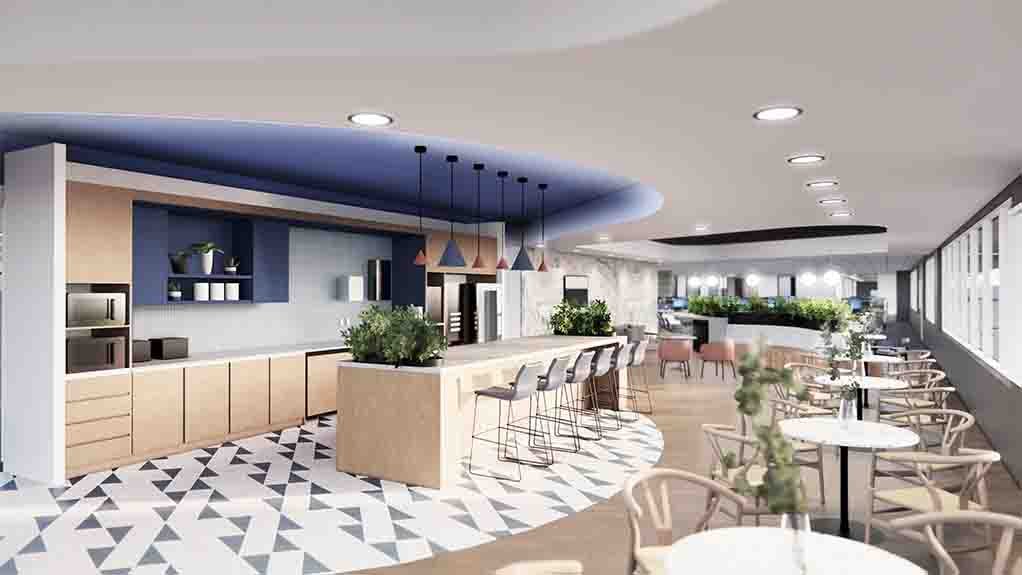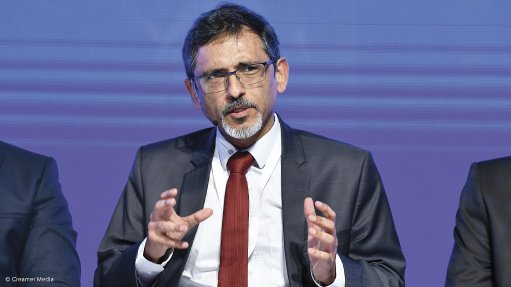There is a bug in your office


The recently reconfigured Liberty Campus in Braamfontein is the first hybrid work ready workplace in Africa
This article has been supplied as a media statement and is not written by Creamer Media. It may be available only for a limited time on this website.
The pandemic has disrupted the workplace forever. Lockdowns that were implemented to curtail the spread of the COVID-19 pandemic have evolved societal expectations of the workplace. The hybrid work model, consisting of both working remotely and from the office, has facilitated productivity and efficiency which cannot be ignored, despite organisational and team culture issues.
Enterprising corporate real estate (CRE) and facilities management (FM) practitioners are helping business leaders to navigate the challenge in the context of the “return-to-office” drive. This drive must consider all stakeholders’ expectations. These stakeholders include employees who have already embraced the hybrid work model; shareholders who expect the model to feature in organisational strategy and the cost of operating the workplace to reduce in lieu of the model; and society that expects the model to positively impact the environment. The return to the pre-pandemic workplace as if the disruption did not occur may result in organisations haemorrhaging talent.
“Workplaces were long overdue for a shakeup lest they are stuck with a ‘bug’ like Y2K. The vast majority of offices were designed for efficiency only in an era in which employees’ decisions were restricted to the places where they wanted to work and the times that they preferred to be in the office. Meanwhile, work settings were pretty much limited to desk and meeting areas. All of this has now changed. Purposeful office attendance, flexibility and choice are now the hallmark of the modern workplace. Only a few organisational functions still always demand office attendance. The role of reformist CRE and FM professionals is to facilitate this transition for the organisation,” says Dave Khasebe, author of the Fourth Place and Founder of dkmc, a maverick corporate real estate and FM consultancy.
dkmc played a pioneering role in evolving the workplace to bring it in line with 21st century expectations. The recently reconfigured Liberty Campus in Braamfontein was undertaken on behalf of Liberty Group. Notably, it is the first hybrid work ready workplace in Africa. Khasebe refers to the futuristic or future proofed workplace as the “Fourth Place”. The Fourth Place, he explains, converges the first place where people live; the second place where they work; and the third place where they usually socialise and collaborate.
The project was justified through the immense value that it created. According to Khasebe, the four “Es” that FM aims to achieve include “efficacy”, “efficiency”, “experience” and the “environment”. “Efficacy” was verified by gathering strategic evidence to align the new workplaces to strategy. The Liberty campus project delivered top management’s five strategic brief and themes for the new workplace, namely “Modern and Connected”; “Bold and Empowered”; “Flexible and Human”; “Productive Anywhere”; and “Right-sized”.
“Efficiency” was determined by a right-sized campus that was efficient to deliver a perpetual return-on investment. The project reduced the number of head office facilities from two to one, which was a more than 40% reduction in square metres and possible sale of facility. “Experience” was achieved by engaging employees in co-creating a workplace which delivered according to their expectation. The result is achieving more than 90% employee experience rating. The last “E”, namely “environment”, was realised by the notable reduction in the carbon footprint of the transformed workplace, with the campus projected to achieve a 5-star green building rating.
These are in line with the “transformist” FM approach that agitates for change and extends beyond mere Delivery FM that is only concerned with one “E”, namely efficiency. It is guided by the progressive Strategic Facilities Management Standard, SANS 1752, with its two-dimensional mindset of demand and deliver, for which Khasebe was the lead architect and helped to implement. Prior to this development, there were no management standards for the CRE and FM industry and thus the often-repeated efficiency mindset of traditionalists.
Khasebe has immersed himself in the evolution of the workplace since 2000 when he was asked to evolve the head office of a leading telecommunications company in Africa as the then Senior Manager for Workplace Services. To familiarise himself with the subject, he made an intense study of the work of Francis Duffy, a British architect and founder of DEGW. Many of Duffy’s earlier theorical concepts regarding the office remain the foundational basis of Khasebe’s workplace insights today.
However, it was the views of futurist and inventor, Sir Arthur C. Clarke, that provided Khasebe with a sense of opportunity that he needed to pioneer the Fourth Place, while also helping to shape his current opinions of hybrid work models. Clarke had earned himself the moniker Prophet of the Space Age for accurately forecasting satellite technlogy during before its time during World War ll, and subsequently also accurately predicted first manned space travel. As early as the 1970s, Clarke predicted that employees would eventually be able to work from any location in the world by 2001. Information technology and human resources experts also often refer to Clarke’s work to help better prepare organisations for evolution of work and workforces. Other professionals mention the futurist’s work to make a point about modern society and its evolving expectations. Workplaces that do not cater for his “work-from-anywhere” forecast are viewed as having a “bug” which will make them malfunction and lose talent, especially knowledge workers.
Khasebe explains that evolving a workplace is a four-step process. Making a policy decision to embrace “work-from-anywhere” is just the starting point. There are three more steps towards achieving the ultimate objective. They include a scientific approach to studying
business requirements, referred to as evidence-based design (EBD); adapting the space according to the science of EBD; and returning three months after adaptation to conduct post-occupancy evaluation (POE). Improvements were then made based on the evaluation. “CRE and FM are for the ‘cool kids’ now; ‘oldies’ with outdated mindsets are out,” Khasebe says jokingly, although serious about the evolving mindset of CRE and FM practitioners. He colloquially refers to both “swag” and “smarts” as important requirements for real estate and the workplace to transform organisations.
Of the four steps, he says that the second is the most enlightening because this is where various ideas converge. Khasebe expounds, “EBD is a subset of evidence-based practice (EBP). EBP promotes the establishment of occupational practices on scientific evidence. The move towards EBP attempts to encourage and, in some instances, force professionals and other decision-makers to pay greater attention to evidence to better inform their decision-making. Shifting the basis for decision making from tradition, intuition and unsystematic experience to firmly grounded scientific research replaces unsound or outdated practices with more effective types.” At Liberty Group, a total of 817 insightful responses were elicited from the e-polls. This was complemented by the information obtained from 30 strategic interviews and 22 workshops that hosted 401 people and generated 39 881 data bytes. This wealth of data was useful in shaping strategic conversations and decisions.
The global lockdown had a seismic impact on the workplace, as well as the CRE-FM industry and professionals. It was very similar to the “Y2K period” of the late 1990s which represented the biggest opportunity and disruptor for the IT industry. This was the moment when organisations looked to and relied on their functional experts for solutions, while exposing inept functions and professionals. He sensed the opportunity early on in March 2020 when organisations had already been forced to adopt “work-from-home” policy. Khasebe decided to make his move after three months if a vaccine had not yet been found and “return-to-office” not spelt out globally and locally. Moreover, he knew real estate investments in the workplace would be significant so he started strategising about how the business case would be made. It was in this context that he commenced with EBD, a concept to which he was first introduced in 2007 when working for another financial services group.
When Liberty Group appointed Khasebe as interim consultant in July 2020 to reopen client facing sites, he was prepared for the most seminal piece of work, describing it as a “once in a lifetime opportunity”. As Khasebe worked long hours to reopen sites and implement non pharmaceutical interventions to keep employees and clients safe, he also collaborated with Liberty Group Real Estate Services division on two other initiatives. They included reorganising the FM team in line with requirements of SANS 1752 and commencing with the
preparatory actions for the EBD work he planned to start as soon as possible. By December 2020, he was already reviewing initial EBD results of two business units which represented more than two thirds of the head office population. Top management and employees wanted the workplace to evolve and provided adequate insights to determine space efficiency gains. The first business case was presented in February 2021 and the project received a tentative nod while the professional team gathered evidence from the rest of business to secure final approval in October 2021. While Khasebe was appointed Liberty Group’s internal Programme Coordinator to bring various stakeholders together and communicate as a single entity, a specialist project management outfit was appointed to procure and project manage construction within a tight deadline of 150 days to reconfigure 48 000m2 of the main facility.
“The project was successfully delivered under the transformist FM model, which evolves FM to always achieve maximum value, that I have evangelised about over the years. This is what we set out to do at Liberty Campus and did exactly that – even exceeding expectations. When completed, we could trace the immense value delivered back to the four Es of corporate real estate. Moreover, the new floor plates in the campus have changed how work is done by turning the ratio of desk-to-collaboration spaces around from 8:2 to 3:7. If an organisation is not engaged in extracting this extent of workplace value, it is probably employing traditional CRE and FM practitioners who are too deaf and blind to seize the workplace moment,” he concludes.
Comments
Press Office
Announcements
What's On
Subscribe to improve your user experience...
Option 1 (equivalent of R125 a month):
Receive a weekly copy of Creamer Media's Engineering News & Mining Weekly magazine
(print copy for those in South Africa and e-magazine for those outside of South Africa)
Receive daily email newsletters
Access to full search results
Access archive of magazine back copies
Access to Projects in Progress
Access to ONE Research Report of your choice in PDF format
Option 2 (equivalent of R375 a month):
All benefits from Option 1
PLUS
Access to Creamer Media's Research Channel Africa for ALL Research Reports, in PDF format, on various industrial and mining sectors
including Electricity; Water; Energy Transition; Hydrogen; Roads, Rail and Ports; Coal; Gold; Platinum; Battery Metals; etc.
Already a subscriber?
Forgotten your password?
Receive weekly copy of Creamer Media's Engineering News & Mining Weekly magazine (print copy for those in South Africa and e-magazine for those outside of South Africa)
➕
Recieve daily email newsletters
➕
Access to full search results
➕
Access archive of magazine back copies
➕
Access to Projects in Progress
➕
Access to ONE Research Report of your choice in PDF format
RESEARCH CHANNEL AFRICA
R4500 (equivalent of R375 a month)
SUBSCRIBEAll benefits from Option 1
➕
Access to Creamer Media's Research Channel Africa for ALL Research Reports on various industrial and mining sectors, in PDF format, including on:
Electricity
➕
Water
➕
Energy Transition
➕
Hydrogen
➕
Roads, Rail and Ports
➕
Coal
➕
Gold
➕
Platinum
➕
Battery Metals
➕
etc.
Receive all benefits from Option 1 or Option 2 delivered to numerous people at your company
➕
Multiple User names and Passwords for simultaneous log-ins
➕
Intranet integration access to all in your organisation



















